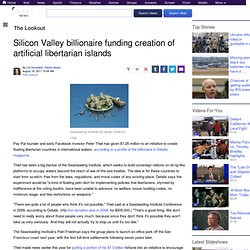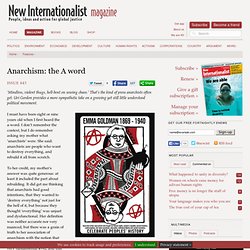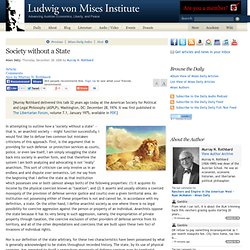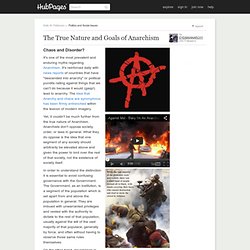

Real examples of anarchism in history are problematic. As near as I can tell, the united States of America is one of the best examples of an anarchist nation that has ever been, though it did not last terribly long before the public servants hired to govern subverted the peoples sovereignty and replaced the dejure united states with a corporation.

From Bouviers Law Dictionary 6th edition: A chief ruler with supreme power; one possessing sovereignty. (q. v.) It is also applied to a king or other magistrate with limited powers.In the United States the sovereignty resides in the body of the people. Vide Rutherf. One which governs itself independently of any foreign power. The union and exercise of all human power possessed in a state; it is a combination of all power; it is the power to do everything in a state without accountability; to make laws, to execute and to apply them: to impose and collect taxes, and, levy, contributions; to make war or peace; to form treaties of alliance or of commerce with foreign nations, and the like.
Silicon Valley billionaire funding creation of artificial libertarian islands. Seasteading Institute city design (Anthony Ling) Pay Pal founder and early Facebook investor Peter Thiel has given $1.25 million to an initiative to create floating libertarian countries in international waters, according to a profile of the billionaire in Details magazine.

Thiel has been a big backer of the Seasteading Institute, which seeks to build sovereign nations on oil rig-like platforms to occupy waters beyond the reach of law-of-the-sea treaties. The idea is for these countries to start from scratch--free from the laws, regulations, and moral codes of any existing place. Details says the experiment would be "a kind of floating petri dish for implementing policies that libertarians, stymied by indifference at the voting booths, have been unable to advance: no welfare, looser building codes, no minimum wage, and few restrictions on weapons. " Anarchism: the A word. Ben Rubin, Emma Goldman/Celebrate People's History, 2002, courtesy of Justseeds.org I must have been eight or nine years old when I first heard the a-word.

I don’t remember the context, but I do remember asking my mother what ‘anarchists’ were. She said: anarchists are people who want to destroy everything, and rebuild it all from scratch. To her credit, my mother’s answer was quite generous: at least it included the part about rebuilding. It did get me thinking that anarchists had good intentions, that they wanted to ‘destroy everything’ not just for the hell of it, but because they thought ‘everything’ was unjust and dysfunctional. I think I was lucky; imagine what most kids hear in response to the same question. TheAntiTerrorist on Government. Society without a State - Murray N. Rothbard. [Murray Rothbard delivered this talk 32 years ago today at the American Society for Political and Legal Philosophy (ASPLP), Washington, DC: December 28, 1974.

It was first published in The Libertarian Forum, volume 7.1, January 1975, available in PDF.] In attempting to outline how a "society without a state" — that is, an anarchist society — might function successfully, I would first like to defuse two common but mistaken criticisms of this approach. First, is the argument that in providing for such defense or protection services as courts, police, or even law itself, I am simply smuggling the state back into society in another form, and that therefore the system I am both analyzing and advocating is not "really" anarchism.
This sort of criticism can only involve us in an endless and arid dispute over semantics. Nor is our definition of the state arbitrary, for these two characteristics have been possessed by what is generally acknowledged to be states throughout recorded history. The True Nature and Goals of Anarchism. It's one of the most prevalent and enduring myths regarding Anarchism.

It's reinforced daily with news reports of countries that have "descended into anarchy" or political pundits railing against things that we can't do because it would (gasp!) Lead to anarchy. The idea that Anarchy and chaos are synonymous has been firmly entrenched within the lexicon of modern imagery. Yet, it couldn't be much further from the true nature of Anarchism. Rewilding (anarchism) Rewilding is the process of re-instating the role of keystone species to human society where the expression of this role appears lacking[citation needed].
The term originates in conservation biology in which "rewilding" stands for the re-introduction of keystone species into areas where such species appear locally extinct[citation needed]. Rewilding in the anarchist context applies this concept to initiating and regenerating human culture that embodies the role of a keystone species[citation needed]. In green anarchism and anarcho-primitivism, humans are believed to be "civilized" or "domesticated" by industrial and agricultural progress. Supporters of such human rewilding argue that through the process of domestication, human wildness has been altered by force.[1] Rewilding is about overcoming human domestication and returning to behavior inherent in human wildness.